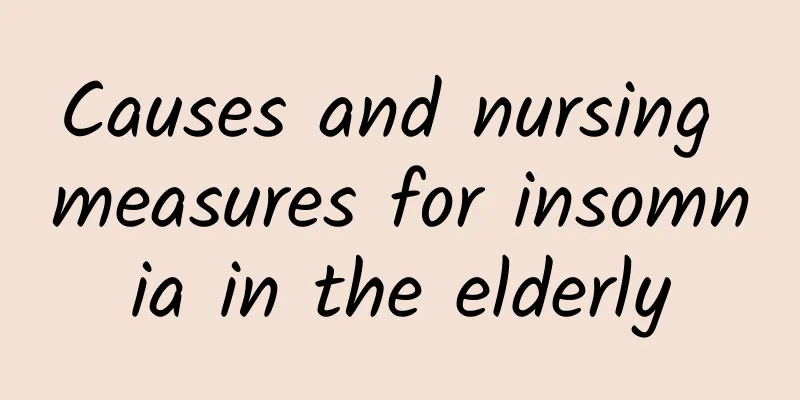Causes and nursing measures for insomnia in the elderly

|
Insomnia refers to a sleep condition in which one cannot fall asleep for a long time at night or has poor sleep quality. Insomnia usually causes adverse effects such as daytime fatigue, lack of concentration, mood swings, and physical discomfort. Insomnia can be temporary or long-term. Difficulty falling asleep, frequent awakenings at night, early awakening, shallow sleep, daytime fatigue and sleepiness, and lack of concentration are common symptoms of insomnia. As they age, the elderly often encounter a series of sleep problems, among which insomnia is particularly common. Insomnia in the elderly not only affects the quality of daily life, but may also have long-term negative effects on physical health. 1. Causes of insomnia in the elderly 1.1 Physiological changes: With age, the body's internal sleep cycle, sleep hormone secretion and other physiological mechanisms may change, which may make the elderly more susceptible to sleep problems. 1.2 Health problems: Cardiovascular disease, respiratory problems, bone and joint diseases, digestive system diseases, and neurological diseases such as Alzheimer's disease and Parkinson's disease. The above chronic diseases may cause insomnia in the elderly. 1.3 Side effects of medications: Elderly people often need to take various medications to control different health problems. Some medications may have side effects that affect sleep. 1.4 Environmental factors: Changes in the sleeping environment such as noise, light, and temperature can also affect the sleep of the elderly. 1.5 Psychological factors: Psychological factors such as anxiety, depression, sadness, life changes, emotional problems, etc. may cause insomnia in the elderly. 1.6 Social factors: The elderly may experience social factors in their lives, such as retirement, death of relatives, and migration of children, which may also affect their sleep. 1.7 Bad sleeping habits: Bad sleeping habits such as irregular sleeping time, excessive napping, excessive dependence on drugs or alcohol may cause insomnia in the elderly. 2. Nursing measures for insomnia in the elderly 2.1 Establish a regular sleep schedule: Ensuring that the elderly go to bed and wake up at the same time every day helps regulate the biological clock and improve sleep quality. 2.2 Maintain a comfortable sleeping environment: You can use devices such as eye masks, earplugs or white noise machines to reduce environmental interference and create a quiet, dark, cool and comfortable sleeping environment. 2.3 Develop good sleeping habits: It is recommended that the elderly take a hot bath, do gentle stretching exercises, read and other activities before going to bed to relax their body and mind, and avoid stimulating activities before going to bed. 2.4 Regular exercise: Moderate physical activity can help improve sleep quality, but strenuous exercise should be avoided in the evening to avoid affecting sleep. 2.5 Dietary adjustment: Avoid consuming stimulating foods and drinks such as caffeine and high-sugar foods and drinks before going to bed. 2.6 Dealing with emotional problems: Psychological support and psychological care should be provided to elderly people for emotional problems such as anxiety and depression, which will help improve sleep. 2.7 Medication management: Try to avoid taking medications that affect sleep, regularly review the medications taken by the elderly, or adjust medication dosage and change medications under the guidance of a doctor. 2.8 Regular physical examinations: Regular health examinations can help prevent insomnia by timely detecting and treating chronic diseases and other health problems. 3. The harm of insomnia in the elderly 3.1 Physical health problems: Insomnia may increase the risk of elderly people suffering from chronic diseases such as cardiovascular disease, hypertension, diabetes, etc. Long-term insomnia may also have adverse effects on the human immune system, increasing the risk of disease infection and disease. 3.2 Decreased cognitive function: Insomnia may lead to a decline in the attention, memory and cognitive function of the elderly, affect daily life activities, and even increase the risk of Alzheimer's disease in the elderly. 3.3 Emotional problems: Insomnia may cause emotional problems such as anxiety, depression, irritability, etc. in the elderly, affecting their mental health and even increasing their risk of suicide. 3.4 Decreased quality of life: Insomnia can cause fatigue and lack of energy in the elderly during the day, affecting their daily life and basic social activities, and reducing their quality of life. 3.5 Safety risks: Insomnia may cause the elderly to be inattentive and slow to react during the day, especially when operating motor vehicles or using machinery and equipment, which will increase the risk of accidents and falls among the elderly. 3.6 Risk of drug abuse: Some elderly people may abuse sedatives, sleeping pills and other drugs to cope with insomnia. Long-term drug abuse may cause drug dependence, drug tolerance and other drug side effects, increasing health risks. Insomnia in the elderly may be caused by a variety of factors, including physiological changes, health problems, side effects of medications, psychological stress, and environmental factors. By establishing a regular sleep schedule, improving the sleep environment, promoting physical activity, dealing with potential health problems, and providing psychological support, it is possible to effectively help the elderly alleviate insomnia, restore their normal sleep patterns, improve their sleep conditions, and improve their quality of life and health. Author: Zhang Tian, Ward 1, General Department, The First Affiliated Hospital of Zhengzhou University |
<<: What is the relationship between anxiety, depression and insomnia?
>>: Latest research! Staying in bed for 30 minutes can really make you feel better
Recommend
The best and fastest way to enlarge breasts through dietary supplements
Breast enhancement is an everlasting topic for fe...
Why is my waist always sore?
Some women may cause certain harm to their bodies...
What causes uterine cold?
The occurrence of uterine cold is the most common...
What causes low estradiol?
Estradiol is the main hormone secreted by the ova...
Women prefer doing this and they age overnight!
Anger is like a devil, it kidnaps one's emoti...
How to treat women's blood deficiency
There are many common problems for women. When so...
Can I detect pregnancy ten days after having sex during ovulation?
For couples who want a baby, if they have sex dur...
Leucorrhea is sticky like paste. Be careful of these barometers of leucorrhea.
Leucorrhea is a barometer of women's health. ...
What is the meaning of sparrow? (The word "jue" and "que" are similar, which means promotion, etc.)
...
Does it hurt when your boyfriend touches your breasts?
In life, most people will touch their breasts whe...
Can I drink Yimu Granules during menstruation?
Many women often take some therapeutic drugs to r...
Bleeding after cervical biopsy
In recent years, the incidence of cervical diseas...
Why do my feet feel sore during late pregnancy?
It is quite common to have sore feet in the late ...
How should students behave in a civilized manner? Sentences about civilized etiquette
In the education of cultivating a cultured person...
What are the symptoms of influenza? How to tell if a cold is caused by a virus or bacteria?
Colds are a common disease in life, but they can ...









